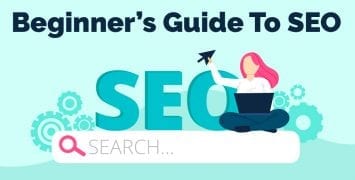At one point in time or another, articles written with SEO in mind could rank on the first page with the right title, keyword density, and backlinks (regardless of length). That was until Google’s Panda update starting penalizing publishers for thin content, duplicate content and just overall poor quality content in general.
You can use Google’s ranking factors as a good starting point, but they don’t answer the question “How long should a blog be.”
The ideal length – Start with your competition
If you want to determine the ideal blog length for any given SERP, start by looking to your competitors. You can easily search a term on Google and get a good idea of what you’re going to need to do to outrank them.
Step 1: Google Search
Search Google by typing your blog header/topic into the search bar. When writing this article, we searched “Ideal blog post length.” The top three results were.
www.wesfed.com
www.snapagency.com (Minneapolis local agency)
www.searchenginejournal.com
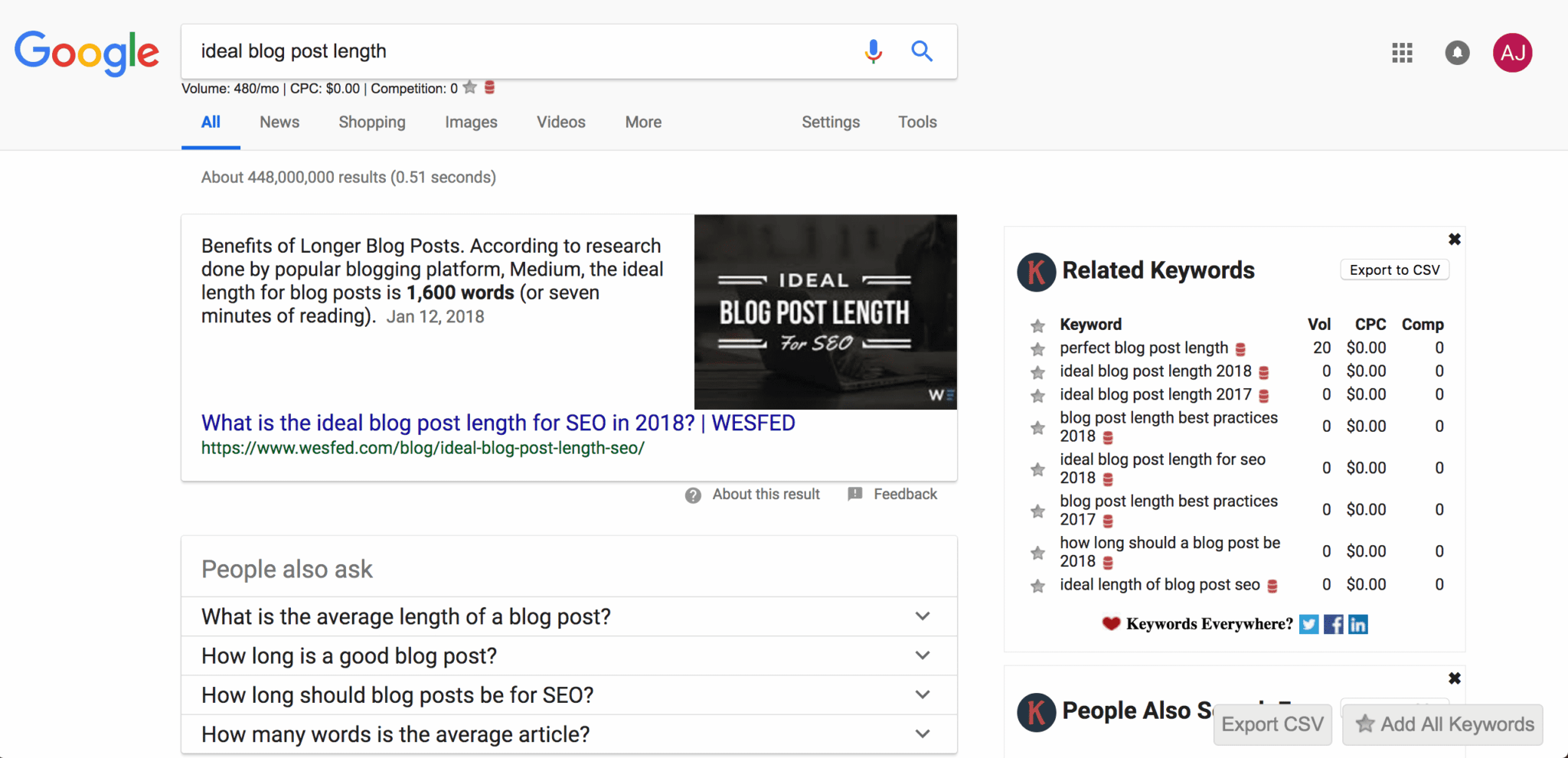
2. Do some copy and pasting
From there, all you have to do is copy and paste the wordcounts into a Word Doc to find out the word counts.
www.wesfed.com: Word count – 1,561
www.snapagency.com: Word count – 1,257
www.searchenginejournal.com: : Word count – 1,216
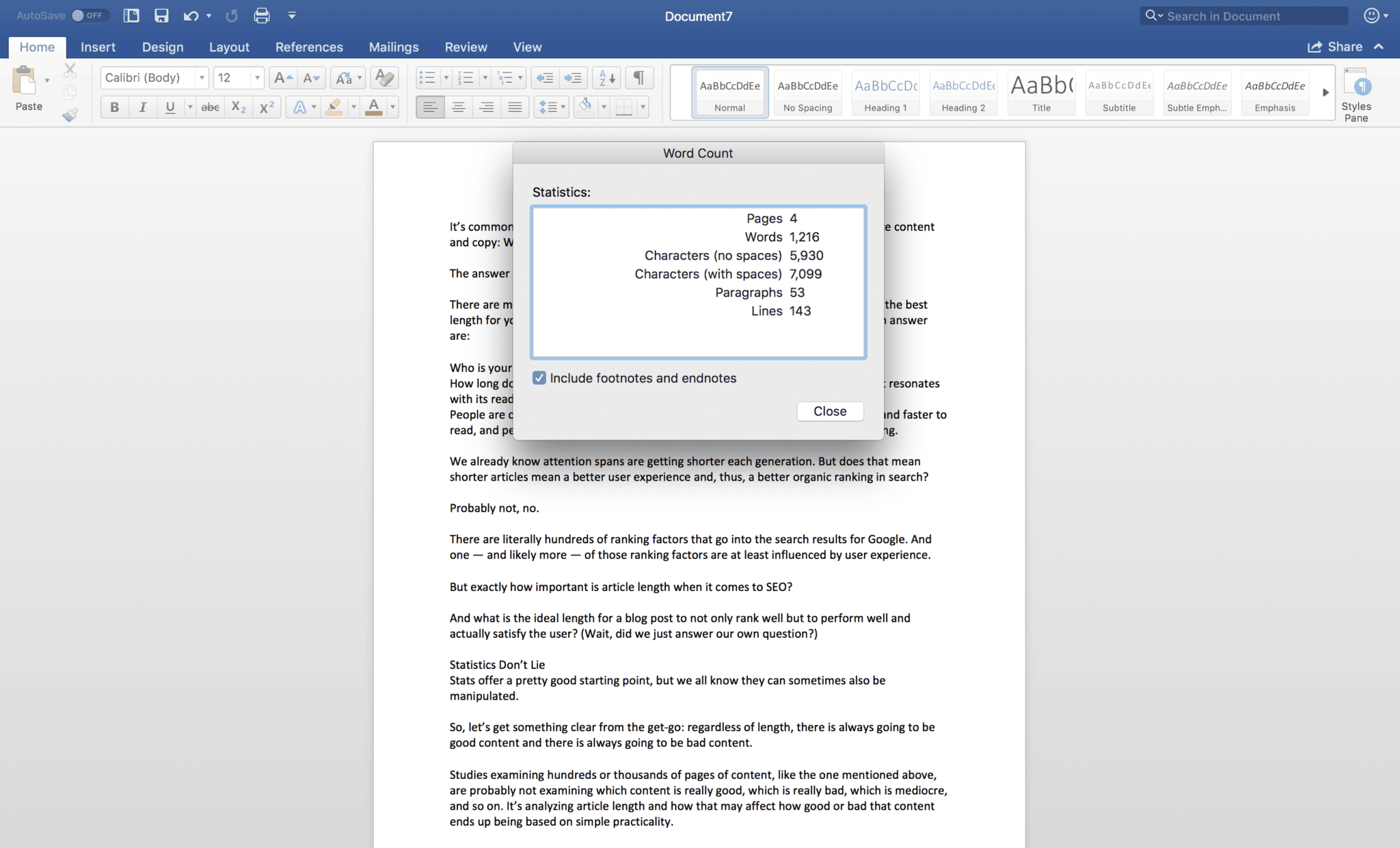
Ironically enough, the highest ranking one is also the longest. However, thisn’t always the case.
3. Put your SEO hat on
Finally, we put our SEO hat on, and we check the backlink profile for each of those specific urls along with the domain and page authority.
Referring domains – 2
Backlinks – 2
Organic Keywords – 131
Domain Authority – 19
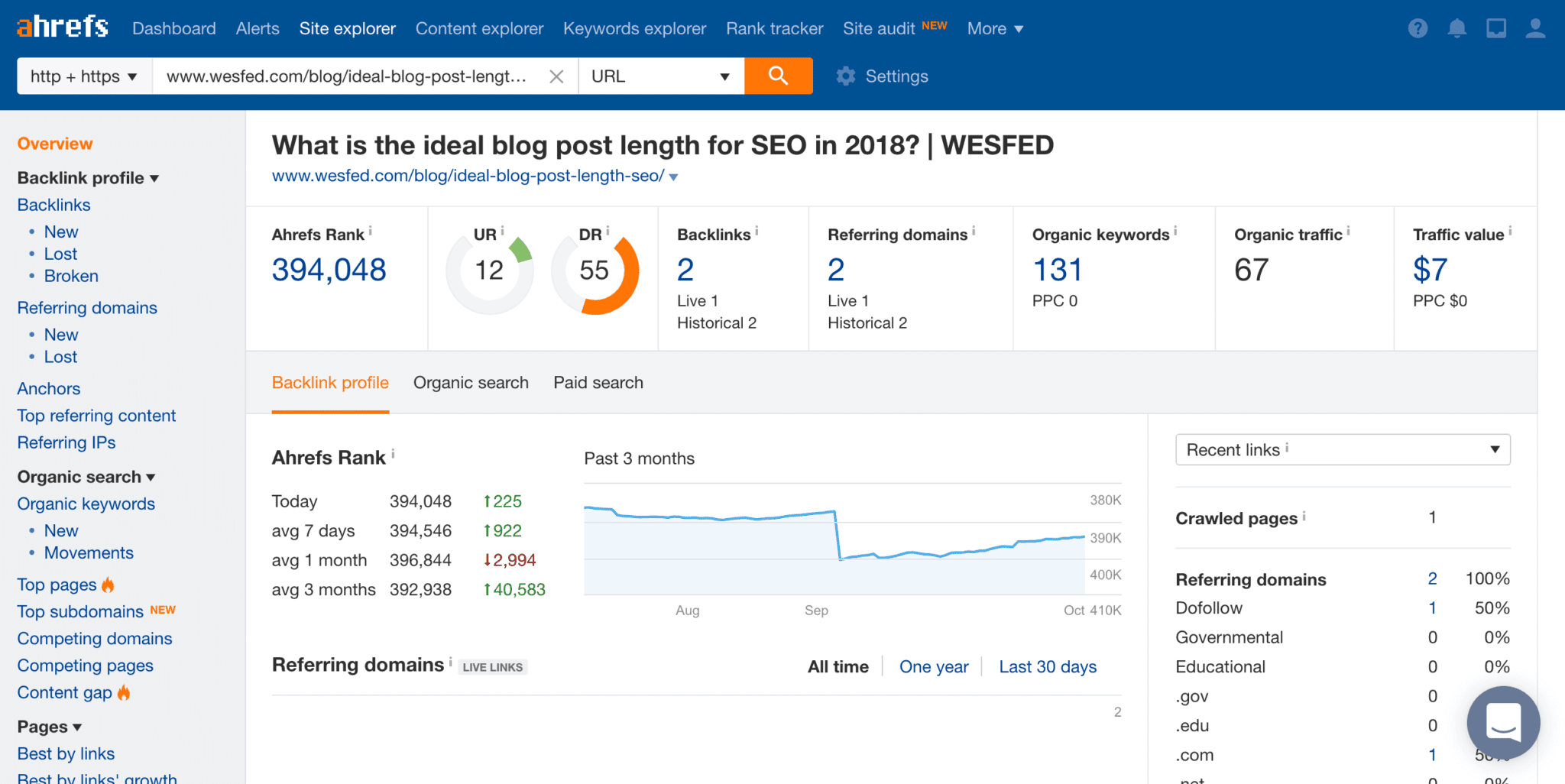
www.snapagency.com
Referring domains – 22
Backlinks – 52
Organic Keywords – 691
Domain Authority – 49
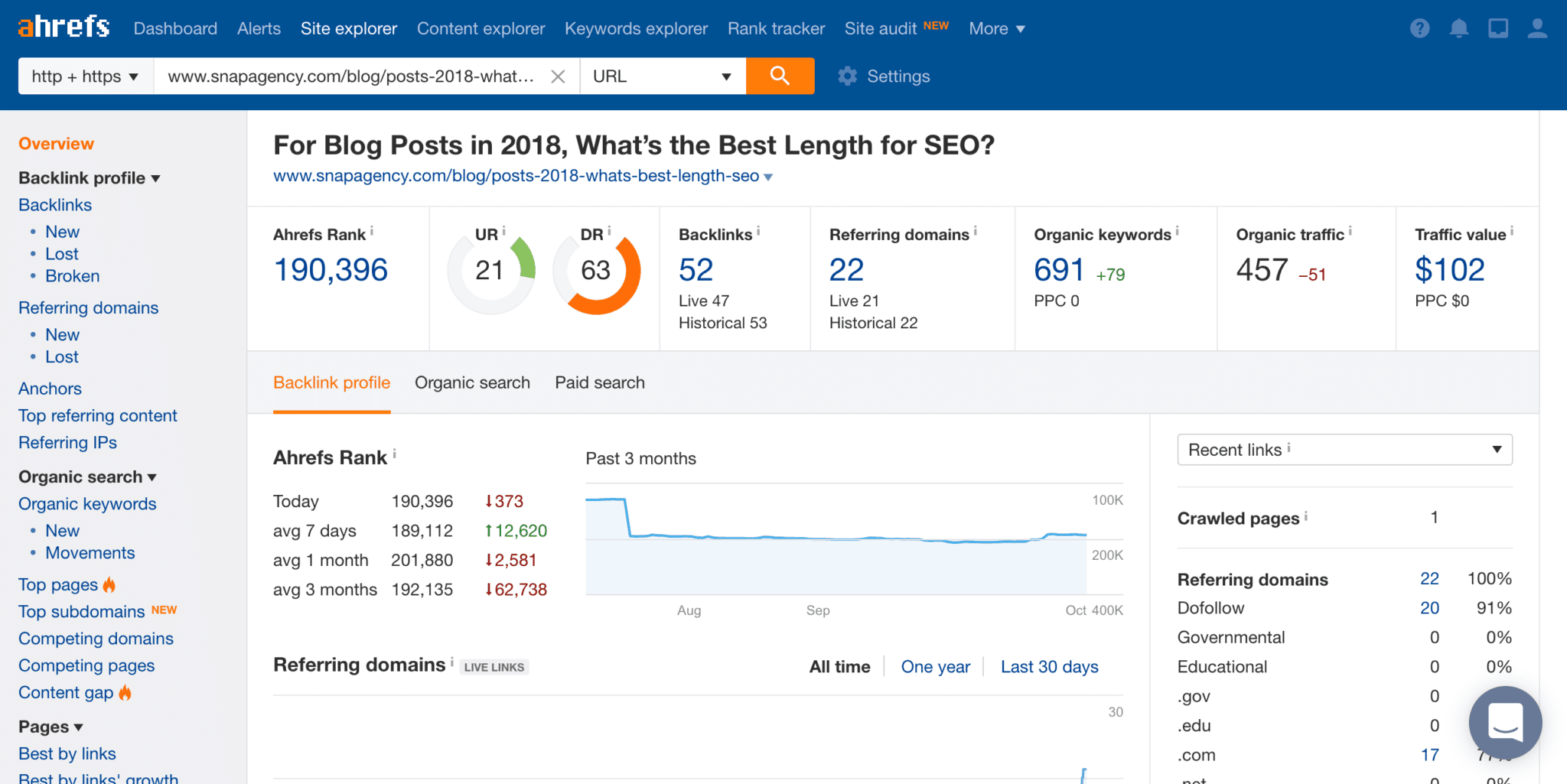
www.searchenginejournal.com
Referring domains – 131
Backlinks – 1,910
Organic Keywords – 309
Domain Authority – 80
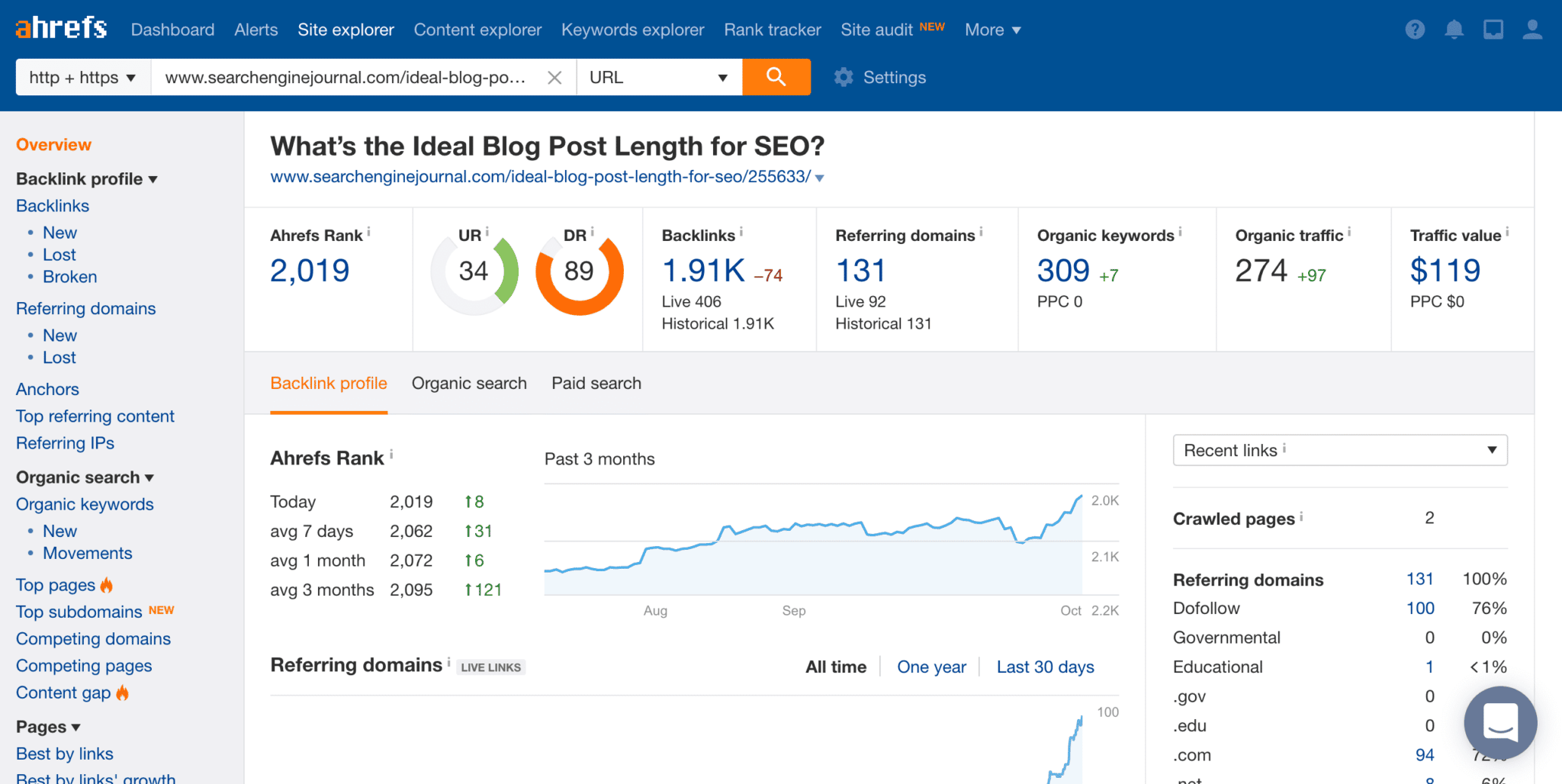
There are dozens of other factors to consider with this specific example including optimization techniques, URLs, title’s, keyword density, etc. However, it looks like Google is saying that the Wesfed article does a great job of answering the core question “What’s the ideal blog post length for SEO.” The number one thing to note here though is that we’re never going to be able to rank this article by writing a measly 600 words.
The typical blog length – Data backed stats.
Typically, when discussing optimum blog length for SEO, this post is cited. https://backlinko.com/search-engine-ranking
If you read through that article, you don’t have to get far to see one of the main points. “Based on SERP data from SEMRush, we found that longer content tends to rank higher in Google’s search results. The average Google first page result contains 1,890 words.”
Or if you use any of the articles featured above, you’ll see that:
“Average content length for Page 1 results is around 1,900 words, according to a 2016 study. That’s a lot longer than the 200- or 500-word blog posts most writers or webmasters think is ideal.”
In both of these cases, the ideal blog length is between 1,500 and 2,000 words.
Here’s the thing though. Although having lengthier content is essential, we say it’s more important to be natural. Don’t just stuff keywords and boring out of date content down peoples throats. If you can’t write 1,500 words on a topic, then don’t! Write your content for the end reader NOT for search engines. Doing this will ensure that you’re content is quality, not just quantity. That being said more often than not, a more thorough explanation on the topic (more content) usually is better for the end user.
Which brings us seamlessly to our next point:
Quality trumps Quantity
Don’t focus specifically on article length. There are too many people out there that are stating the well-cited posts above and are misunderstanding the importance of blogging. It’s essential to have substance when you’re blogging but don’t overdo it.
A good rule of thumb is to imagine summarizing a book. If you were to summarize a book, you’d probably touch on the key points to get the person you’re explaining it to more interested. You probably wouldn’t go into an all-day in-depth review of everything that happened to the main character and your thoughts on it. The real question isn’t “tell me about the book” the real question is “was it good?”; “Why was it good or bad?”; and “Should I watch it?”
Give an end user the real deal, add in what they want to know, and leave out what they don’t care about.
If you’d like us to write some quality posts for your blog to show you how it’s done, check out our blogger packages here.
Don’t just focus on the page length
Having a good quality blog post goes way beyond the writing. Do us a favor, search for anything online, the first three blog results are ALL going to have some multimedia, thorough research backed statistics and written with the user’s interest in mind. That’s because dwell time (the amount of a time a searcher is on the page) is a huge ranking factor for Google.
Our ultimate goal as a content strategist is to offer the best information in an optimal format on the right platform.
Think about the content you’re writing. Given our example above, a book review might be better suited for written words, while a statistic is going to be better suited as a bar or line graph image.
When you’re using these content forms, we recommend always accompanying them with some written content to tie it all together (thus increasing your word count naturally).
Your goal shouldn’t be to write a 3,000-word blog post to ensure that it’s the most optimized length. Your goal should be to supply the best, most useful (optimized) version of the piece of content you’re creating.
So, what’s the real answer then?
The sites that are at the top of Google are there for a reason. Copying what they are doing is a significant way to generate some success. However, you can’t expect to take them down if you’re doing THE same thing in the same way. You’ve got to go out there, make mistakes, and get messy!

By doing this you’re going to provide more value to the end user than the other pages, and you’re going to outrank them.
How? Experiment!
If the #1 SERP for your topic is 1,000 words, write more than 1,000 words. If they have 10,000 words (and you can’t possibly write that much) than improvise by adding additional multimedia. Can you write 5,000 words and shoot a five-minute video? YES, YOU CAN!
Just because the above information shows that most first page Google rankings hover around 1,800 words doesn’t merely mean that writing more content is going to get you to outrank them. The key here is that more detailed posts rank better because they usually provide more thorough information to the end user.
Quick Final Tips/Thoughts
1. Provide more value than your competition
2. Increase multi-media over your competition
3. Answer more questions than your competition
4. Get more backlinks than your competition
5. Optimize your posts better than your competition
Your competitors showed their hands (by being on the first page of Google), now go out there and show them yours.


